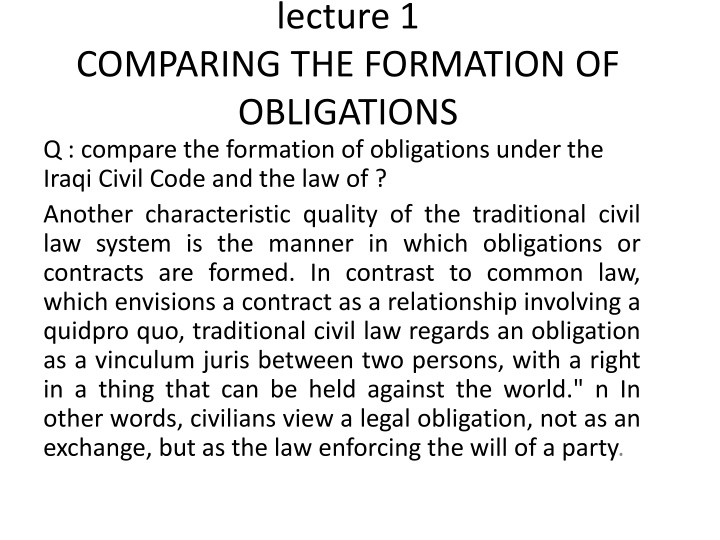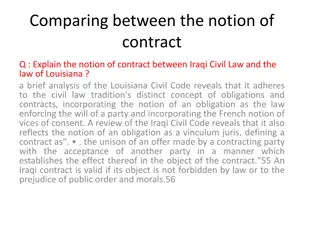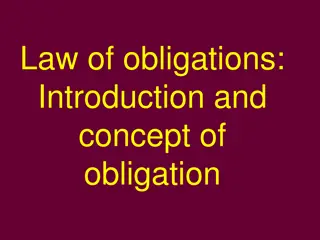Comparing Formation of Obligations: Iraqi Civil Code vs. Traditional Civil Law
The comparison between the formation of obligations under the Iraqi Civil Code and traditional civil law systems reveals distinct perspectives on the nature of obligations and contracts. While common law emphasizes exchanges, traditional civil law views obligations as a means to enforce the will of a party. The concept of cause, essential in civilian systems, ensures that obligations have a legitimate reason, upholding the freedom of contracting parties.
Uploaded on Apr 30, 2025 | 1 Views
Download Presentation

Please find below an Image/Link to download the presentation.
The content on the website is provided AS IS for your information and personal use only. It may not be sold, licensed, or shared on other websites without obtaining consent from the author.If you encounter any issues during the download, it is possible that the publisher has removed the file from their server.
You are allowed to download the files provided on this website for personal or commercial use, subject to the condition that they are used lawfully. All files are the property of their respective owners.
The content on the website is provided AS IS for your information and personal use only. It may not be sold, licensed, or shared on other websites without obtaining consent from the author.
E N D
Presentation Transcript
lecture 1 COMPARING THE FORMATION OF OBLIGATIONS Q : compare the formation of obligations under the Iraqi Civil Code and the law of ? Another characteristic quality of the traditional civil law system is the manner in which obligations or contracts are formed. In contrast to common law, which envisions a contract as a relationship involving a quidpro quo, traditional civil law regards an obligation as a vinculum juris between two persons, with a right in a thing that can be held against the world." n In other words, civilians view a legal obligation, not as an exchange, but as the law enforcing the will of a party.
COMPARING THE FORMATION OF OBLIGATIONS Most historians credit medieval canonists with creating the idea that a bare agreement-an intersection of wills unattended by formalities-constituted the law between the parties. The original definition in Roman law, defining an obligation as a bond, or viculum, remains in contemporary civil law systems. In accordance with that definition, an obligation is personal in nature. Parties are bound because the law acts to enforce the will of a party. The implication is that civil law system contracts do not require consideration-only the consent of the parties, an object, and a just cause.
COMPARING THE FORMATION OF OBLIGATIONS Professor Saul Litvinoff writes: It is not an overstatement to say that in the many centuries that have elapsed since Roman times all contracts have become consensual, that is, all contracts, with very few exceptions, can be validly formed by mere consent. It is as if the classic Roman category of consensual contracts, originally limited to four types, was expanded to cover the whole spectrum of contract. As a result of that expansion, for which jurists of the canonist school take a great part of the responsibility, modem legal systems of the French family allow private parties to bind themselves by their consent alone provided that, perhaps as a remnant of Roman caution, such consent is given for a reason, or cause, and further provided that such reason, or cause, is lawful.'
COMPARING THE FORMATION OF OBLIGATIONS The notion of cause has become a characteristic mark of a civilian system. In civil law systems, [i]f there is no cause, the obligation is as ineffectual as a Roman nudum pactum. In demanding a cause in order to give binding force to an obligation, the law makes certain that persons have a reason to limit their freedom by the bond of obligation, If there is no such reason then there is no bond, and freedom from obligation is restored to the person who thus had bound himself. The will of contracting parties is thereby protected without encroaching upon their freedom, as it must be presumed that reason governs human choices.























